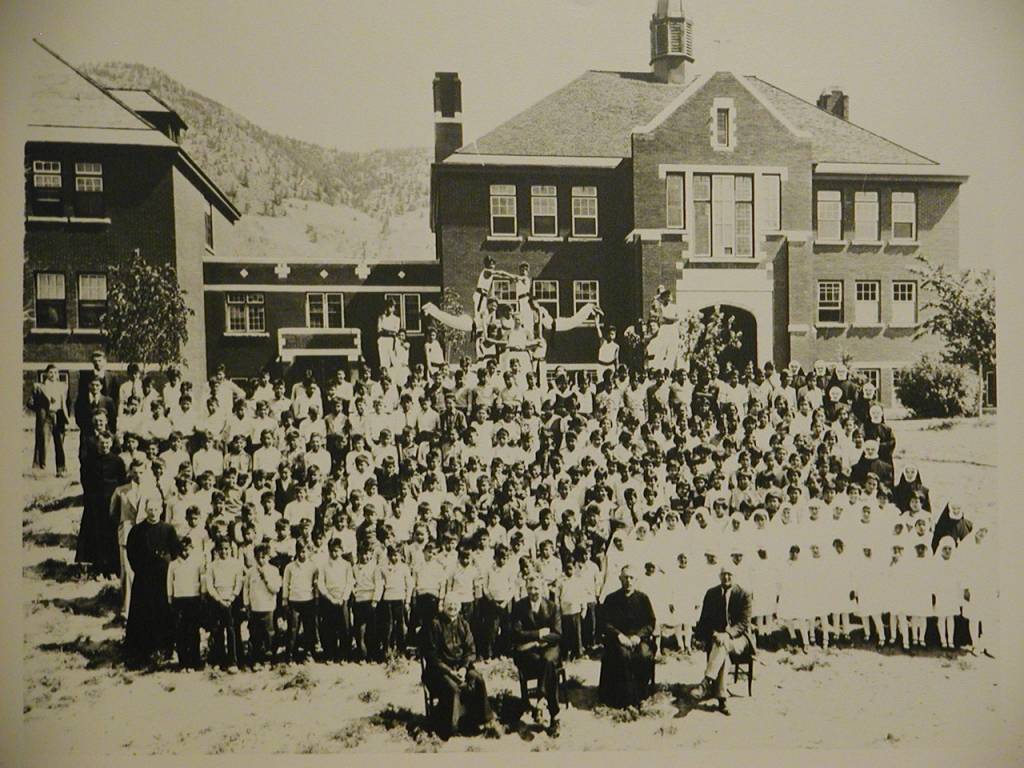

Kamloops Indian Residential School photo shared by MP Leah Gazan
Last Friday, the Tk’emlúps te Secwépemc First Nation reported the discovery of a mass grave with the remains of 215 Indigenous children at a former residential school in Kamloops, BC. The Tk’emlúps te Secwépemc First Nation is working with experts to establish the causes and timings of deaths which are currently not known.
But here’s what we do know. These children were removed from their families by the federal government and forced to attend the Kamloops Indian Residential School. These children died while under the ‘care’ of the federal government and school staff. We know, as the Truth and Reconciliation Report released in 2015 has confirmed, that residential schools were “a systemic government sponsored attempt to destroy Aboriginal cultures and languages and to assimilate Aboriginal peoples so that they no longer existed as distinct peoples.” We know that thousands of residential school survivors have confirmed experiencing emotional, physical, and sexual abuse at the hands of school staff. We know the sad truth that these 215 children are just a small portion of the thousands who were murdered by the residential school system.
We also know that the devastating discovery of these 215 children should have forced our entire country to a standstill. And yet it didn’t.
After ignoring this news for 2 days, our politicians have finally started making statements and lowering flags to half mast. While that acknowledgement is important, it’s barely a drop in the bucket of what is necessary to reckon with the violence and destruction of Canada’s ongoing colonialism.
If you, like us, are looking for next steps in this moment, here are some of the resources that Indigenous groups and individuals in our network have generously shared over the last few days:
Resources and services for Indigenous folks:
- Indian Residential School Survivors Society Counselling Services
- Survivors crisis line is open 24 hours a day & 7 days a week: 1800–721–0066
If you’re a settler, here are some places where you can make a donation to support residential school survivors and their families:
- Indian Residential School Survivors Society
- Legacy of Hope Foundation
- Woodland Cultural Centre’s Save the Evidence campaign
- National Centre for Truth and Reconciliation
- First Nations Child & Family Caring Society
- Reconciliation Canada
- Indspire
- Native Women’s Association of Canada
- Gord Downie & Chanie Wenjack Fund
If you’re a settler, here are some educational resources on residential schools:
- Settlers Take Action resources compiled by the On Canada Project
- Read about the Truth and Reconciliation Commission of Canada and its 94 Calls to Action.
- Yellowhead Institute — Calls to Action Accountability: A 2020 Status Update on Reconciliation
- Find out whose traditional territory you live on. Visit native-land.ca
- Sign up for Indigenous Canada, a free Massive Open Online Course (MOOC) from the Faculty of Native Studies at the University of Alberta that explores Indigenous histories and contemporary issues in Canada.
There’s so much to say at a moment like this. It feels most important at this time to affirm our position that climate justice means aligning ourselves with the struggles for Indigenous sovereignty and decolonization. Standing for climate justice means standing with Indigenous peoples who are resisting colonization and corporate control over their lands every single day.
Standing for climate justice means unequivocally standing with Indigenous land defenders and their allies on Vancouver Island who are protecting some of the last remaining old-growth forests in the world. Over the last few weeks, hundreds of these courageous land defenders have been arrested opposing the logging of old-growth trees. To show your support, click here.
Standing for climate justice also means acknowledging the disproportionate impact of climate impacts on Indigenous communities across so-called Canada and around the world. Wildfire season has started with major fires burning across Manitoba and Saskatchewan, and the rest of Western Canada watching the weather to see what might come in the weeks and months ahead. Here’s a resource about why we must decolonize our response to wildfires by centering Indigenous leadership and knowledge.
This is usually the part in one of these where we would write something like “don’t worry, it’s always darkest before the dawn” but that feels forced and contrived.
So instead, we just wanted to tell the truth, the world is hard and heavy right now. We’re all feeling that. The most that we can do right now is learn more about everything that’s happening and lend our voices, money, and support to Indigenous-led solutions.
In solidarity,
Atiya, Amara, Cam, Chris, Clayton, Emma, and Katie (the 350 Canada team)
You were found in unmarked graves
Acts of genocide
Your precious lives takenWith spirits so strong
we heard your cries
To go homeRest well little ones
And fly high with our ancestors
We will not forget youYou are sacred
#215 #KamloopsResidentialSchool pic.twitter.com/6Xuter4DKP
— Leah ProudLakota (she/her) (@LeahGazan) May 30, 2021
Hey @JustinTrudeau, I just wanted to say how mad and hurt I am, fuck you and #Canada, do better… #215 #Kamloops
— Clayton ThomasMüller (@CreeClayton) May 31, 2021
TRC has documented the deaths of over 6,000 residential school students, adding that there are probably more. Those deaths put the odds of dying in Canadian residential schools over the years they operated at about the same as for those serving in WWII. https://t.co/qXCsMgzUVy
— Connie Walker (@connie_walker) May 29, 2021
1996. That’s when the last residential school closed
I graduated in 1995 from one of them.
Don’t tell me or anyone else that this was a long time ago.
— Bannock Thee Hammock (@BannockHammock) May 29, 2021


0 Commentaires